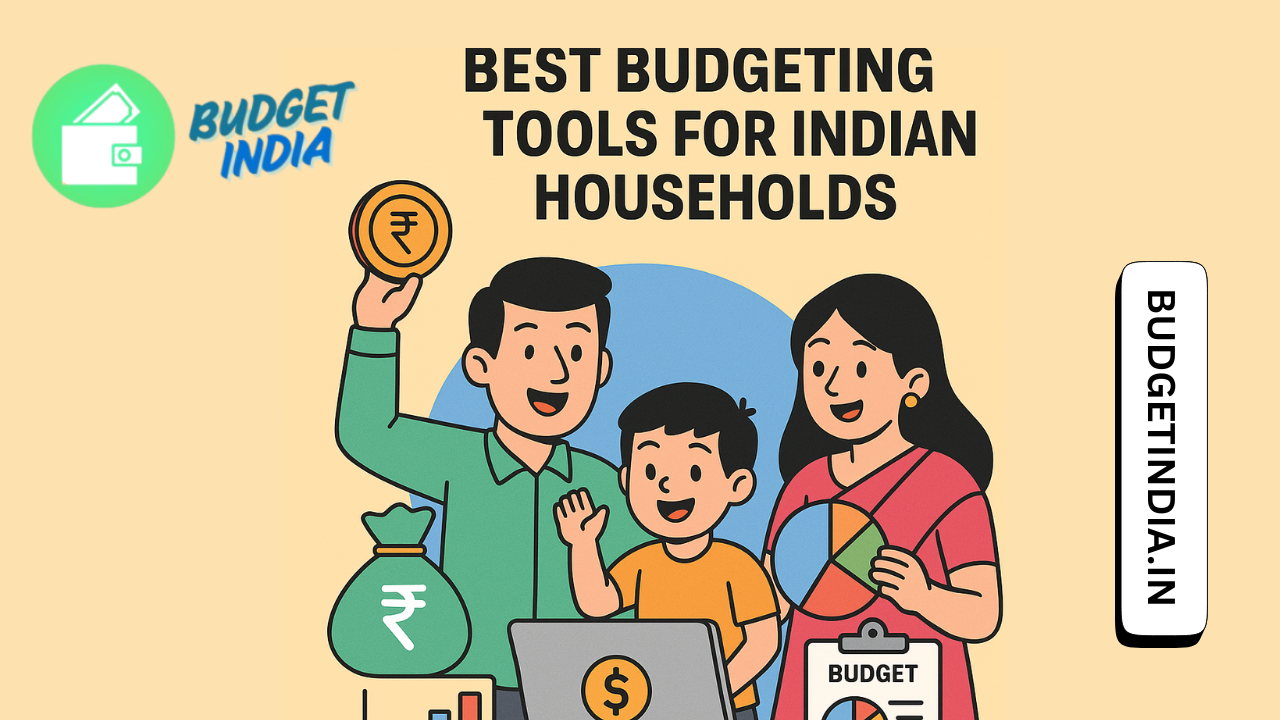Budgeting Tools have become essential in 2025, especially for the modern Indian household that juggles multiple financial responsibilities—rising living costs, EMIs, investments, school fees, and that occasional impulse Swiggy order. In a world where money flows in and out with a few taps on your phone, keeping track of every rupee is no longer a luxury; it’s a necessity.
But here’s the reality: most of us don’t need a degree in finance to manage our money better. What we need is clarity, discipline, and a tool that can do the hard work for us—track our expenses, categorize our spending, alert us when we’re going off the rails, and help us plan ahead. That’s exactly what modern budgeting tools offer.
These digital apps are designed to fit into your life seamlessly. They read transaction messages, sync with your bank accounts, monitor your goals, and give you insights that help you make smarter decisions. And in 2025, with India’s digital economy surging, the choices are better than ever.
So, if you’re tired of wondering where all your money went every month, it’s time to let these budgeting tools give you the answers.
1. Walnut
Best for: SMS-based expense tracking
Overview: Walnut is perfect for those who want automation without linking their bank accounts. It reads transactional SMS messages and builds your expense profile accordingly. Think of it as an intelligent notepad that works in the background.
Key Features:
- Automatically tracks expenses from SMS
- Budget setting and monthly reports
- Splits bills and tracks group spends
Pros:
- No bank account linking needed
- Lightweight and easy to use
- Useful for shared expenses
Cons:
- SMS parsing can miss new apps
- Interface hasn’t evolved much recently
2. Fi Money
Best for: All-in-one digital banking and budgeting
Overview: Fi isn’t just a budgeting tool—it’s a neobank for digital-savvy Indians. It combines a zero-balance savings account with features like expense analysis, automated savings “Jars,” and smart reminders.
Key Features:
- Expense categorization and insights
- Goal-based saving and investing
- UPI, debit card, and net banking integration
Pros:
- Seamless experience with built-in bank account
- Excellent UI and smart features
- Nudges you when you overspend
Cons:
- Needs you to open a Fi account
- Not useful for tracking cash spends
3. Money View
Best for: Overall personal finance management
Overview: Money View is a powerhouse. It not only tracks expenses but also manages loans, credit cards, and gives you a real-time credit score. It’s ideal for people with complex financial lives.
Key Features:
- Budget planner and EMI tracker
- Credit score monitoring
- Net worth and cash flow dashboard
Pros:
- Excellent for those with multiple accounts
- Helps manage and repay loans smartly
- Reliable tracking for bills and EMIs
Cons:
- Push notifications for loans can be annoying
- Some features locked behind paywall
4. Cube Wealth
Best for: Investing alongside budgeting
Overview: Cube Wealth is not just about saving money—it’s about growing it. It combines smart budgeting features with curated investment options, including mutual funds, digital gold, and U.S. stocks.
Key Features:
- Investment and savings tracking
- Expert financial advisor access
- Budget visuals and goal-based plans

Pros:
- Ideal for salaried professionals
- Combines wealth creation with budget control
- Custom plans based on risk appetite
Cons:
- Overwhelming for beginners
- Some features behind premium access
5. Buddy by CRED
Best for: Credit card users and premium spenders
Overview: If you already use CRED to manage your credit card bills, Buddy is a natural extension. It gamifies budgeting, rewards you for saving, and gives real-time insights into spending patterns.
Key Features:
- Smart card tracking
- Goal-based budgeting
- Cashback and rewards
Pros:
- Best for credit card-heavy lifestyles
- Simple and elegant design
- Integrated with CRED platform
Cons:
- Only available to CRED users
- Doesn’t track offline or cash-based expenses
6. YNAB (You Need A Budget)
Best for: Serious budgeters with zero-based mindset
Overview: YNAB is the gold standard in budgeting philosophy. It’s built on the principle that every rupee should have a purpose. While not India-specific, it offers powerful tools to manage income, plan expenses, and correct course mid-month.
Key Features:
- Zero-based budgeting model
- Real-time syncing across devices
- Flexible adjustments
Pros:
- Best for complete financial control
- Helps build long-term money habits
- Great for couples and families
Cons:
- Expensive subscription (₹8,000+/year)
- Lacks UPI and SMS integration
For more, visit YNAB
Choosing the Right Budgeting Tool in India
The perfect budgeting tool depends on your financial personality:
| Budgeting Need | Ideal Tool |
|---|---|
| Automatic tracking via SMS | Walnut |
| All-in-one bank + budgeting | Fi Money |
| Credit tracking & net worth view | Money View |
| Budget + investments | Cube Wealth |
| Lifestyle-oriented spenders | CRED Buddy |
| Serious monthly planners | YNAB |
If you’re just starting out, choose simplicity. If you’re looking to scale your financial planning, look for tools that combine budgeting with savings and investment features.
Final Thoughts
In a world where spending has become digital and often invisible, budgeting tools act as your financial GPS. Whether you’re trying to survive the month or build wealth over time, the right tool gives you control, discipline, and peace of mind. So take your pick, set it up, and let your money start working for you—not the other way around.
FAQs
1. What are budgeting tools, and why do I need them?
Budgeting tools are digital apps that help you track income, categorize expenses, set financial goals, and improve money management. They reduce manual effort and offer clarity on where your money is going.
2. Are budgeting tools safe for use in India?
Yes. Most popular apps use bank-level encryption, comply with RBI norms, and do not store sensitive data without permission. Always use apps from verified developers and official app stores.
3. Can I use a budgeting tool without linking my bank account?
Yes. Tools like Walnut use SMS-based tracking. However, linking your account gives deeper insights and better automation.
4. Which budgeting tool is best for beginners?
Walnut and Money View are beginner-friendly. They require minimal setup and give clear overviews of your spending patterns.
5. Do these apps help with saving money?
Yes. Most tools provide insights, alerts, and even automated saving features. Apps like Fi and Cube Wealth also allow you to set aside money into digital “jars” or invest it systematically.






Leave a Reply